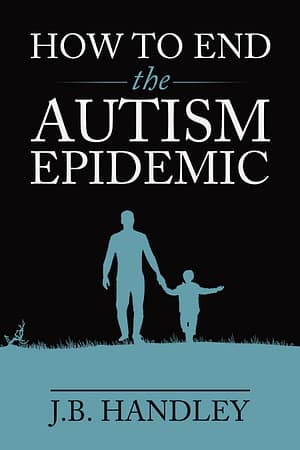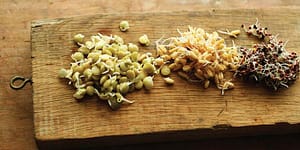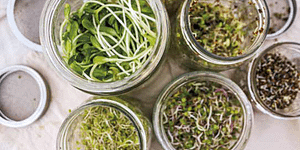A Story for Parents: A Parent’s Worst Nightmare

For parents, there’s nothing more nerve wracking than making sure our children are safe and healthy. Unfortunately, it’s not always clear how to do that especially when it comes to vaccines.
In his new book, How to End the Autism Epidemic, author J.B. Handley confronts the common misconceptions about vaccines and empowers parents to be their children’s best health advocates.
The following interview was originally published by Mercola. It has been adapted for the web.
In this interview, J.B. Handley, founder of Generation Rescue, discusses autism and what he believes can be done to help turn this tragic trend around. This is also the topic of his book, How to End the Autism Epidemic.
A Parent’s Worst Nightmare
Handley’s son has autism, and his personal experience ultimately motivated him to write this book. He describes the family’s experience, and what led them to take a nonconventional approach to their son’s treatment:
“My wife and I were what I would characterize as very mainstream parents, which meant that when our second son was born in 2002, we basically handed him to our pediatrician and did whatever he told us to do, which meant following the Centers for Disease Control and Prevention’s (CDC) recommended [vaccine] schedule.
We started to watch our son decline physically after every vaccine appointment at 2 months, at 4 months, at 6 months and at 12 months. He got eczema. His belly became distended. He had sleep disturbances. He had dark circles under his eyes. We kept going back into the doctor and saying, ‘What’s going on? What’s happening with him? Where is this coming from?’
We could never get a plausible explanation for what was happening. Then, shortly after my son turned 1 year old, he started to decline neurologically. He lost his words. He lost many of his normal mannerisms. He started doing these really unusual behaviors.
He started craving certain foods — all these things that somebody like you knows are red flags for a child heading towards autism. But at the time, we were ignorant to this and our pediatrician didn’t help us at all.
We were living in Northern California. We took our son to University of California San Francisco (UCSF) where they diagnosed him with severe autism. At the same time, we visited a Defeat Autism Now! (DAN!) doctor in Pleasanton … Dr. Lynne Mielke.
We were presented with two completely different worlds. At UCSF, autism was genetic. It was lifelong. He was likely to be institutionalized. There was nothing we could do about it, except to prepare ourselves.
But in Pleasanton, thirty miles away, autism was triggered by vaccines. It was an environmental illness. If you vetted the diet and started to do things differently, some of these children recovered completely. Here’s my wife and I, both educated at Stanford, both very mainstream, and we’re put at these crossroads for what to do for our son …
In our case, we went to the facts. We went to the reality of how our son had declined after being on a normal path of development. We ultimately made a decision that we did believe that the vaccines triggered our son’s autism. We did believe that biomedical interventions could work for him.
That opened a whole new door to us. Soon after that, in ’05, my wife and I founded Generation Rescue. The reason that we founded it was to share the information that we had learned with other parents. That’s where our journey began.”
Recovery Is Possible
Today, Handley’s son is 16, and has made dramatic improvement through biomedical intervention. He regained his speech, learned to read, and can go on long family trips without incident. Still, he continues to be affected by autism, and this is a reality for many parents. While some children are able to make a complete recovery, others do not. Most, however, can make improvements. Even at 16, Handley’s son continues to improve, and new biomedical interventions are becoming available. Prevention is key, though, and making vaccination decisions are an important part of that.
“I think, in many ways, that the jury is in on this. My book is bolstered by the fact that two of the titans of the mainstream autism medical community have changed their tune through depositions, and now support the things that parents have been saying for decades.
I think that those two scientists [Dr. Andrew Zimmerman and Dr. Richard Kelley], who people don’t know about, and the way they’ve changed their tune are going to have a dramatic impact on this debate.
We’re talking about scientists from the Kennedy Krieger Institute at Johns Hopkins University, arguably the pre-eminent institution in the country focused on autism, who are saying exactly what parents are saying — that in a vulnerable subset of children, vaccines are, in fact, the trigger of autism.”
Autism Triggers Are Pernicious
Like Handley, I believe vaccines can play a role in autism, although it’s certainly not the sole factor or trigger. In the last half of the 20th century, not only has the vaccine schedule grown, with many vaccines being added, but our food supply has also been inundated with glyphosate, and there’s been a radical increase in the exposure to electromagnetic fields. All three of these factors are pernicious, and there’s evidence showing all three can play a role in autism development. Heavy metal exposure is another factor.1 That said, the connection between autism and the introduction of vaccines in many children is quite clear.
“The interesting science that’s come about since the mid-2000s and beyond concerns this notion of an immune activation event in the brain of a child. We believe that immune activation events are actually what causes autism. The question is, ‘What’s the trigger for those immune activation events?’ because there could be a myriad of triggers.
In the emerging science, which has largely been developed in other countries, it shows us how aluminum, specifically — aluminum, which the whole purpose of it being in a vaccine is to hyperstimulate the immune system — in certain vulnerable kids, can create a persistent immune activation event, sort of a simmering inflammatory event in the brain.
That simmering inflammatory event, if it happens during critical phases of brain development, can cause a child to head into autism. Those analysis models, unlike the epidemiology the CDC did that was not that helpful trying to discern causation, most analysis models are showing us, with some very specific data about the brain, just how a vaccine can trigger an immune activation event that then leads to autism,” Handley says.
Aluminum Hyperstimulates the Immune System
Aluminum is a known neurotoxin, and in vaccines, the aluminum is in a nanoparticulate form, which when injected makes it all the more problematic. When injected, macrophages, which are part of your immune response, are sent to the injection site, where they gobble up some of that aluminum.
“The [macrophages] grab the aluminum that they don’t know what to do with. Some portions of those macrophages end up in the brain. They sit there, and it’s called biopersistence. The aluminum just sits in the brain and the body doesn’t know how to get it out,” Handley says.
There’s also evidence that aluminum exposure may be, at least in part, responsible for the massive rise in autoimmunity among children as well. In short, the aluminum hyperstimulates the immune system, causing it to overreact to proteins that otherwise would not cause a reaction.
Evaluate Risks Versus Rewards
Handley suggests that parents need to weigh the pros and cons, and ask themselves which health risks they’re willing to take to protect their child against any given disease.
“Do I want [my child] to get a rotavirus vaccine if the risk is asthma? Do I want [them] to get a Haemophilus influenza type B (Hib) vaccine if the risk is a lifetime of diabetes or some other autoimmunity and a much higher risk of autism?
By not acknowledging the very real risks of these vaccines, parents aren’t in a position to make an informed decision about whether or not they’re worth it for them,” Handley says.
“I personally would support an immediate return to the 1985 schedule. Children were not dying in the streets. It wasn’t the Dark Ages. We have to do something radical if we’re going to change this chronic disease epidemic …
Autism, for a family, is devastating. I think one of the things that really frustrates me about this epidemic is the whitewashing of autism … The truth is most children with autism can’t speak … [they] will never live alone … [they] will never have a job. Most children with autism require daily and hourly care [and] die early.
We can never look away from the severity of this epidemic or this disability for most of the children affected by it. It’s because of the devastating nature of the disability that it puts such a strain on families.
My heart goes out to families that are lower income, work two jobs or they’re struggling to make ends meet, and then autism gets dropped into their lives. It’s simply devastating and untenable. We’ve got to do something about it.”
Do Your Homework
One of the most questionable vaccines, in my view, is the hepatitis B vaccine, which is given on the day of birth. Not only does it contain aluminum, there’s simply no real justification for administering it to all healthy newborns, as hepatitis B can only be contracted from IV drug abuse, sexual activity with an infected partner, a blood transfusion using contaminated blood, or from an infected mother. It would be far more sensible to simply screen pregnant women for the disease, and only give the vaccine to infants whose mothers actually test positive for hepatitis B. The Hib vaccine also contains aluminum, and it, too, is given very early on, the first dose usually administered at 2 months old. Handley points out that parents should do their own research and make an informed vaccination decision for their child.
“You need to gather data on each vaccine and decide for yourself, ‘Is the risk-reward there for me?’ If you do that research and you decide it’s there for you, all the more power to you. This is a free country. I believe in medical freedom. I believe that everybody should use whatever intervention they think is appropriate for their child.
What I don’t believe in is that a parent should walk into an office with a child who’s 2 months old, having not done the research, hand your child over to the pediatrician and they stick the child with six vaccines and you can’t name what any of them are. By the way, that’s a mistake I made.
That’s the message I try to send to other parents: ‘Be way more informed. Be way more vigilant.’ There are pediatricians in every market who are more open. Find those pediatricians and work with them. Focus on the health of your child, not on implementing the CDC’s vaccine schedule.
Recognize that there are many pediatricians who are motivated by their insurance company to have really high vaccination rates. Because of that, they may not have your child’s best interests at heart. They may have the bonus that they’re getting from their insurance company at heart. That’s really inappropriate but happens all the time …
I have a singular motivation: to tell the truth and to save as many children as possible from the fate that befell my son … Guilt wrote this book, if you will. The two ways that I found to deal with that guilt is, one, to focus on my son in helping him get better, and, two, to warn as many parents as possible.”
Recommended Reading
For the Love of A Child: A Family’s Fight and a Father’s Love
https://www.chelseagreen.com/2018/cowan-princples-autoimmune-diet/
Recent Articles
Learning how to ask questions that will elicit relevant information is as much an art form as creating an herbal formula. Follow this broad list as a starting point.
Read MoreWant to start your own medicinal herb garden? Passionflower, lemon balm, and goldenseal are great places to begin! These herbs are jam-packed with medicinal properties and easy to grow in a majority of climates.
Read MoreSprouts are easy to cultivate, mature quickly and pack a nutritional punch! You can make nutrient-rich sprouts from all kinds of edible seeds in your kitchen.
Read MoreSuffering from frequent headaches is miserable and immobilizing. If you haven’t had luck treating and preventing your headaches, skip the over-the-counter approach and prepare herbal formuals for migraines to use in the future! The following is an excerpt from Herbal Formularies for Health Professionals, Volume 4 by Jill Stansbury. It has been adapted for the…
Read More








